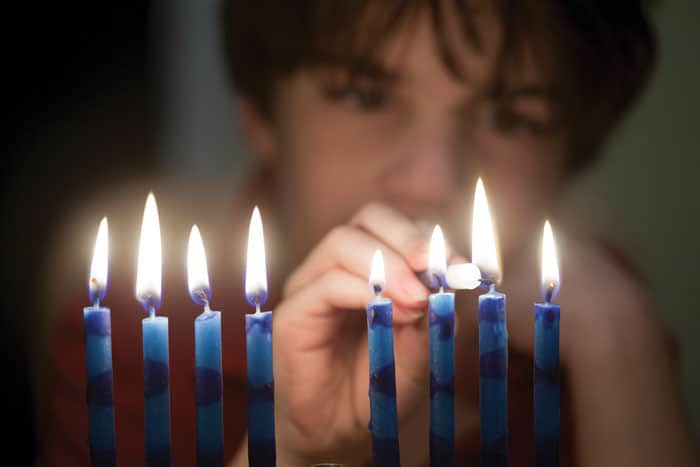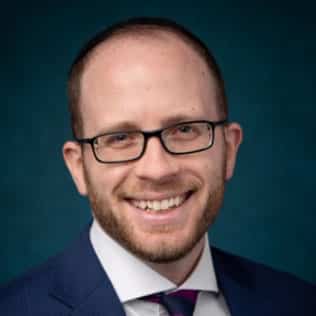 kickstand/Getty Images
kickstand/Getty Images Stop me if you’re heard this one before. Times were tough and hope hung by a thread. Enemies lurked in the shadows while the righteous few clung to the belief that deliverance might improbably arrive, perhaps in the form of a miracle. And all that was left was a small jug of oil. Then, a menorah was lit, a small act symbolizing salvation.
No, I’m not talking about the Maccabees.
Seven hundred years or so before those famous freedom fighters liberated Jerusalem from the hands of the nefarious Syrian-Greek forces of Antiochus IV, there was Elisha. The prophetic successor to Elijah, Elisha lived in Israel during an era of conniving kings and constant warfare. Two brief tales about this miraculous figure, involving a jug of oil and a menorah, are well worth remembering in this current moment.
As the fourth chapter of the book of II Kings recounts, amidst a brief pause in his rebuking of misbehaving monarchs, Elisha encounters the widow of one of his own late disciples. On the verge of having her two children seized by creditors, the woman is desperate for whatever support she can get.
“What can I do for you?” Elisha offers.
“I have nothing in my house except for a jug of oil,” she responds.
Elisha instructs her to borrow as many empty vessels from her neighbors as she can. He tells her to begin pouring whatever is left from her small container into the borrowed ones. She runs, gathers the jugs, and begins pouring. And keeps pouring. And pouring. The jugs, now forming a line around her simple home, are filled to the brim. “Now, says Elisha, “Go sell the oil and pay your debt, and you and your children can live on the rest.”
Having provided for the widow and her kids, Elisha then continues on his way to a town called Shunem. There he visits a family who had hosted him periodically during his travels around the country. Elisha’s visits were frequent enough that the wife suggested to her husband that they build him a guest room in their attic, a means of expressing their appreciation for the messenger of God stopping to rest in their home. There they placed a bed, a table, a chair and a menorah, a lamp.
Elisha, moved by their generosity of spirit, asks the couple how he can repay them for their kindness. The wife, barren, asks for a son. Elisha, possessor of powers from the divine, promises her she will have one in a year. Sure enough, she does. Tragically, when the boy is a few years old, he suddenly falls sick and passes away. The distraught mother then tracks down Elisha. Through her tears, she expresses how broken she is by the child she never expected she would merit having now being taken from her so shockingly. Elisha climbs onto the bed next to the menorah, where the child had been placed. As II Kings 4:34 describes, “He put his mouth on its mouth, his eyes on its eyes, and his hands on its hands, as he bent over it. And the body of the child became warm.” Having revived the boy, he hands her to the speechless mother. So overtaken with gratitude she simply bows down, embraces her child, and leaves the room.
While these brief episodes rarely merit a mention in Jewish communal memory, as we celebrate the dramatic national liberation led by Judah the Maccabee and the subsequent Hasmonean lamp-lighting that gifted us the holiday of Hanukkah, they are well worth considering.
Though the Maccabees’ discovery of a small jar of oil amidst the embers of their hard-fought fight enabled the Temple menorah to be lit, Elisha’s story reminds us that that first spark can begin at home.
Though the Maccabees’ discovery of a small jar of oil amidst the embers of their hard-fought fight enabled the Temple menorah to be lit, Elisha’s story reminds us that that first spark can begin at home. While it might not garner national headlines like a war or the rescue of a holy site from our sworn enemies, it can burn just as bright. Writing of his own return to his Jewish roots in an exquisite essay titled “The Menorah,” Theodore Herzl concluded by noting that while when only one candle is lit, “it is still dark and the solitary light looks gloomy,” when a companion candle, inspired by the first, is aflame, “the darkness must retreat.” Then “when all the candles are ablaze everyone must stop in amazement and rejoice at what has been wrought. And no office is more blessed than that of a servant of this light.” As Herzl understood, one individual can brighten a whole nation’s hopes.
Secondly, Elisha reminds us that, buried beneath the six-column headlines about kings and presidents, nations and battles, there’s always someone out there who could benefit from the simple question Elisha asked – “What can I do for you?” Amidst Israel’s fight against Hamas, countless acts of kindness are the sinews binding Israeli society together. They came not from bureaucratic ministers or military strategists — those folks were understandably busy with other things. It was the grilling burgers for hungry soldiers, the pizza deliveries to moms with husbands at the front and young children at home, the teens who taught preschoolers to draw Shabbat Shalom cards to send to soldiers, the Airbnb’s turned no-cost shelters for refugees from the range of the terrorists’ bombs, and the medical and police volunteers, that allowed the nation to power through the constant pressures of wartime.
Lastly, while unwrapping Hanukkah presents is undoubtedly a holiday highlight, Elisha reminds us of the greatness of gratitude. As Dr. Tal Ben-Shahar, the former Harvard professor and author of numerous best-selling books on happiness has argued, “when you appreciate the good, the good appreciates.” Citing the psychologists Robert Emmons and Michael McCullough, Ben-Shahar notes that “setting aside as little as a minute or two a day to write down five things one is grateful for turned out to have far-reaching consequences. Beyond being more grateful about life as a whole, participants who persisted over a period of a few weeks were more joyful, energetic, and helpful to others. They also slept better and experienced fewer symptoms of physical illness.” While no one expects you to prophesize births or revive the dead as a means of saying “thank you,” you can still, like Elisha, offer what you can to express how appreciative you are for the kindness you receive.
This Hanukkah, then, while we light our candles in memory of the Maccabees, let us raise the shamash, that candle that lights all the others, for Elisha. After all, it was he who first taught us the blessing of what it means to spark salvation, one hope-filled jug at a time.
Rabbi Dr. Stuart Halpern is the Senior Advisor to the Provost and Senior Program Officer of the Straus Center for Torah and Western Thought at Yeshiva University, and the editor of “Esther in America” (Maggid Books).























 More news and opinions than at a Shabbat dinner, right in your inbox.
More news and opinions than at a Shabbat dinner, right in your inbox.